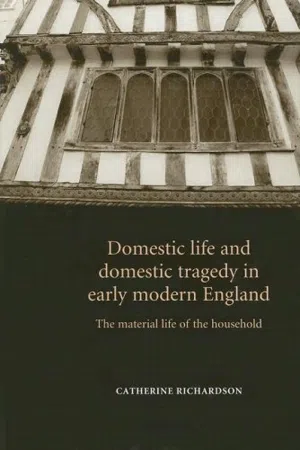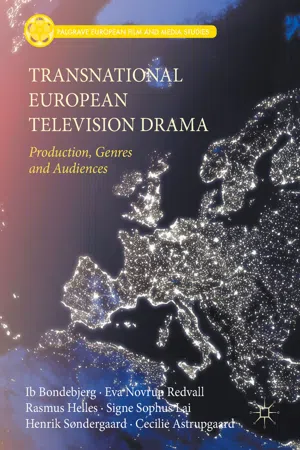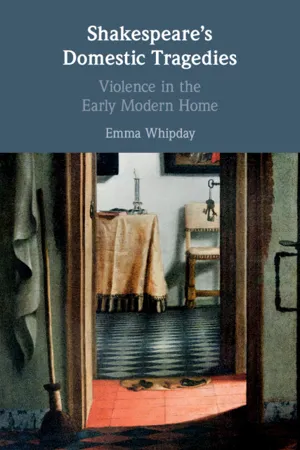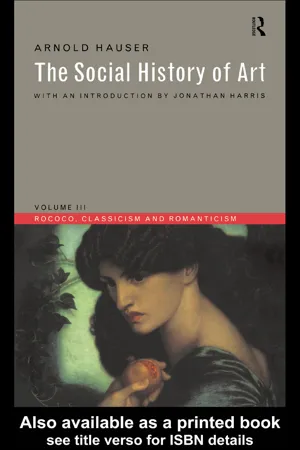Literature
Domestic Drama
Domestic drama refers to a genre of literature that focuses on the everyday lives, relationships, and conflicts within a family or household. It often explores themes such as marriage, parenting, and social dynamics within the home. Domestic dramas typically emphasize the personal and emotional aspects of characters' lives, offering insights into human behavior and societal norms.
Written by Perlego with AI-assistance
Related key terms
1 of 5
4 Key excerpts on "Domestic Drama"
- eBook - ePub
Domestic life and domestic tragedy in early modern England
The material life of the household
- Catherine Richardson(Author)
- 2013(Publication Date)
- Manchester University Press(Publisher)
2 and therefore one where authority must uniquely be negotiated through, rather than outside, intimacy, and where the individuality (with all its particular strengths and weaknesses) on which patriarchal structures tend to flounder cannot be avoided. In the household, the disparity between role and character is potentially at its height.All of these meanings of the household were articulated in the way domestic tragedies were staged. The crimes which they portray are crimes of familiarity, as Frances Dolan has suggested.3 They are born out of constant presence and its erosions of humanity and their consequences are dealt with within these bounds. Tragedies which take place within the household have the specific intensity which accompanies small spaces, with their concentration upon action and reaction. Interpersonal dynamics have traditionally been seen as shaping the genre, but it is the way those dynamics play out within the confined rooms of the house which gives the dramas their compelling power. These plays have been compared unfavourably to ‘tragedy proper’. The ‘domestic’ as a setting has been taken to mean ‘reduced’ – the tragic universe of Lear scaled down from the broad heath under the broader sky to the walls of the house; the disintegration of the individual spirit condensed into, rather than expanded out of, human surroundings.4 This diminishing has, understandably, been read in relation to the plays’ own protestations of limited representation: the ‘barren subject’ and ‘bare scene’. In other words their scale has been seen as a paucity of both imagination and representation; the former too prosaic and the latter too concrete. But thinking about them spatially suggests instead that the condensed world they offer is one intensified by its restrictions. Adams argued that the most powerful of these plays present to the reader ‘people who, for a time, transcend their petty existences through the terrifying power of their ruling passions’, but for early modern men and women this seems to outline a wrong relationship between daily life and emotion.5 The terrifying power of passion was the very reason for domestic organisation, and the mismatch he suggests between the magnitude of emotion and the scale of its context misunderstands the moral status of the bounded nature of the household. It was surely because emotion was seen as being in regular danger of exploding the primacy of the communal over the individual that the containing system of analogous spheres came about. In a period in which the ceiling over of halls brought the house down to size, Lena Orlin suggests that it ‘scaled itself to, echoed, and reassured’ the human figure of ‘his own significance and centrality’, and this reading is partly borne out by the developing levels of comfort which it offered.6 But it is only half of the story. As it was for the Husband in A Yorkshire Tragedy - eBook - PDF
Transnational European Television Drama
Production, Genres and Audiences
- Ib Bondebjerg, Eva Novrup Redvall, Rasmus Helles, Signe Sophus Lai, Henrik Søndergaard, Cecilie Astrupgaard(Authors)
- 2017(Publication Date)
- Palgrave Macmillan(Publisher)
National essentialism in defining TV drama is problematic; rather, it is an ongoing process of interaction between existing patterns and the national contri- bution to and variation of those patterns. As Dhoest concludes, “domes- tic fiction is not essentially national, but it may be perceived as such by viewers because of its familiarity”. 8 FACING EVERYDAY LIFE AND THE SOCIETIES … 187 Dramatic plots and high-intensity drama are characteristics of the second type, the social-political drama, with narratives focusing on a broader social story and context, dealing with different social groups and often taking up controversial social and political issues. In the Danish Borgen (2010–2013), we follow the rise and fall of a female Danish prime minister, but we also deal with some of the most explosive inte- rior and international conflicts in Danish politics, and the chaotic pri- vate life of some of the key figures. The BBC’s The Honourable Woman (2014) is a political thriller about the Israel–Palestine conflict seen from the perspective of an idealistic UK foundation and showing the intrigues of three national secret service agencies. Private life and families are very important here too. Social and political drama points to the many ways in which politics has prominent dimensions of ‘personalization’ and ‘dramatization’ (van Zoonen 2005: 145). Politics is deeply influenced by narratives with different core conflicts—the quest for power, bureau- cracy and lack of accountability and transparency, conspiracy and abuse of power are some of the most prominent. THE HISTORICAL ORIGINS OF CONTEMPORARY TV DRAMA IN EUROPE There seems to be a strong tradition of European TV soaps focusing on everyday life, families and specific neighbourhoods, although some countries—for instance in Scandinavia—have never had many such series, and certainly not those running for decades. - eBook - PDF
Shakespeare's Domestic Tragedies
Violence in the Early Modern Home
- Emma Whipday(Author)
- 2019(Publication Date)
- Cambridge University Press(Publisher)
Domestic tragedy makes a bold claim: it asserts the importance of the private world, and shows that households outside the elite sphere can be performed onstage and taken seriously. It demonstrates that characters from the same world as many in the audience can attain tragic stature, and suggests that their tragedies, like the tragedies of kings, Introduction 18 18 can provoke tears. Domestic tragedy also stages the dangerous, subver- sive, and powerful potential of transgressions within non-elite homes; it demonstrates how the (insubordinate) behaviour of those in subordinate gender and class positions can affect the fortunes and threaten the safety of the kingdom, and undo the God-given hierarchy of Church and state. Hamlet, Othello, and Macbeth do not fit this definition of domestic tragedy; the tragic action of these plays unfolds in foreign, elite settings, distanced from the quotidian world of domestic tragedy. Furthermore, whilst domestic tragedies stage the impact of violent homes upon house- hold inhabitants and the surrounding neighbourhood, Hamlet portrays the impact of criminal transgressions in a royal household upon both that household and Denmark as a whole; Othello stages marital murder in a Venetian household in Cyprus, a household crime that affects the lead- ership of a state’s wars; and Macbeth explores the murder of a king in a household that is also a castle, and the resulting repercussions for an entire kingdom. Yet in staging the violent homes of these plays, Shakespeare borrows social, spatial, ideological, and psychological constructions of the home from domestic tragedies, and is in dialogue with portrayals of tragic domesticity in the kinds of street literature (from news pamphlets to broadside ballads) that provide much of the source material for domestic tragedies. In so doing, he shows that tragic events within familiar and rec- ognisable households can be worthy of the aesthetic scope and heightened language of conventional tragedy. - eBook - ePub
Social History of Art, Volume 3
Rococo, Classicism and Romanticism
- Arnold Hauser(Author)
- 2005(Publication Date)
- Routledge(Publisher)
3.THE ORIGINS OF Domestic Drama
The middle-class novel of manners and family life represented a complete innovation compared with the various forms of heroic, pastoral and picaresque novel, which had dominated the whole field of light fiction until the middle of the eighteenth century, but it was by no means so deliberately and methodically opposed to the older literature as the middle-class drama, which arose in conscious antithesis to classical tragedy and became the mouthpiece of the revolutionary bourgeoisie. The mere existence of an elevated drama, the protagonists of which were all members of the middle class, was in itself an expression of the claim of this class to be taken just as seriously as the nobility from which the heroes of tragedy had sprung. The middle-class drama implied from the very outset the relativizing and belittling of the heroic and aristocratic virtues and was in itself an advertisement for bourgeois morality and the middle-class claim to equality of rights. Its whole history was determined by its origins in bourgeois class-consciousness. To be sure, it was by no means the first and only form of the drama to have its source in a social conflict, but it was the first example of a drama which made this conflict its very theme and which placed itself openly in the service of a class struggle. The theatre had always propagated the ideology of the classes by which it had been financed, but class differences had never before formed more than the latent, never the manifest and explicit content of its productions. Such speeches as, shall we say, the following had never been heard before: ‘Ye Athenian aristocrats, the injunctions of your kinship morality are inconsistent with the principles of our democratic state: your heroes are not only fratricides and matricides, they are also guilty of high treason.’ Or: ‘Ye English barons, your reckless manners threaten the peace of our industrious cities; your crown- pre-tenders and rebels are no more than imposing criminals.’ Or: ‘You Paris shopkeepers, money-lenders and lawyers, know that if we, the French nobility, go under, a whole world will go under which is too good to compromise with you.’ But now such things were stated quite frankly: ‘We, the respectable middle class, will not and cannot live in a world dominated by you parasites, and even if we ourselves must perish, our children will win the day and live.’
Index pages curate the most relevant extracts from our library of academic textbooks. They’ve been created using an in-house natural language model (NLM), each adding context and meaning to key research topics.



